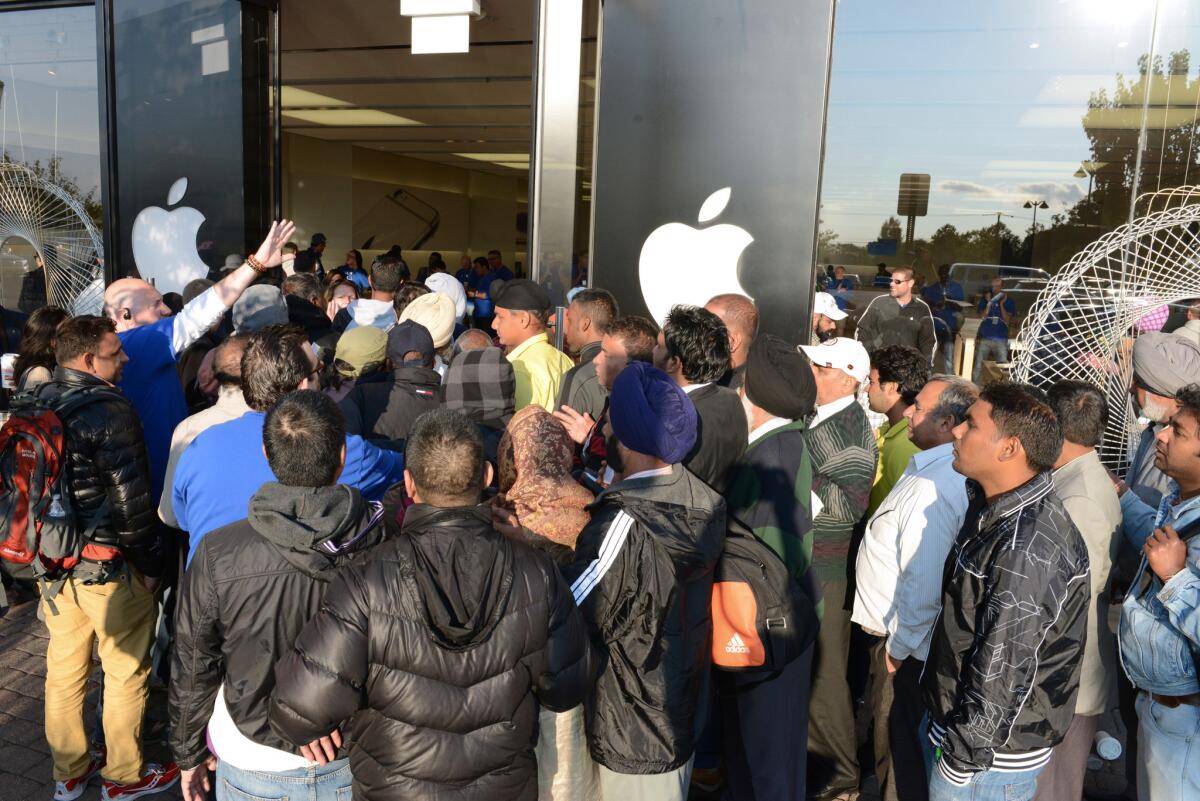Opinion: New bill would protect the market for used high-tech goods

- Share via
It may be hard to imagine as you gaze upon your shiny new iPhone 6, but there just may come a day when you’ll want something even newer and shinier.
At that point, you may decide to sell your iPhone on eBay or Craigslist to offset the price of its replacement. But what if Apple said you couldn’t sell a working version of one of its products? What if Apple demanded that buyers of its used gear pay a hefty fee to activate the operating system, or required them to pay for a service contract?
Sounds outrageous, right? Yet that’s exactly what some manufacturers of high-tech business equipment do. For example, Palo Alto Networks, which makes firewalls for corporate networks, requires buyers of used versions of its products to pay a non-refundable certification fee just to have the device examined to see if it can be put into service, then pay an activation fee and sign up for at least a year’s worth of service before the device can be turned on.
Or consider Hewlett-Packard, which requires that buyers of certain used HP servers pay $400 to license the software needed to operate them. Why? Because, the company explains, when it sells a server, it doesn’t relinquish ownership of the copy of the software inside it. Instead, it merely grants the buyer the right to use it -- a right that vanishes when the equipment is resold.
Manufacturers say they take these steps to protect their intellectual property -- in particular, the copyrighted software that’s crucial to their devices. Although the “first sale doctrine” in copyright law grants buyers the right to sell, lease, rent or give away a work after they buy it, they are not allowed to make copies of that work. That limitation has given manufacturers a rationale for imposing after-sale restrictions that effectively eliminate a buyer’s first-sale rights.
Rep. Blake Farenthold (R-Texas) wants to stop this practice before it goes any further. On Thursday he introduced a bill called the “You Own Devices Act” -- yet another measure with a title contorted for the sake of a memorable acronym -- that aims to restore the first-sale rights for software-powered devices.
The main beneficiaries of Farenthold’s bill in the short term would be businesses, which are more likely than consumers to encounter restrictions such as the ones imposed by Palo Alto Networks and HP. Yet it’s not hard to imagine the makers of smartphones, networked appliances and other “smart” household goods going that route too as a way to discourage people from buying used devices instead of new ones. After all, the more mature a product is, the less dramatic the changes are from year to year, and the harder it becomes to persuade people to buy the latest, most expensive version.
And before too long, almost every device will be “smart.” Microchips have become pervasive, and connectivity is extending to almost anything electric inside a house -- or parked in the garage. “I’m sure there is a car company executive somewhere who would love to put a dampener on the secondary market,” said Sherwin Siy of Public Knowledge, a consumer advocacy group that supports the bill.
Under the bill, if a piece of software enables a device to operate, the rights to that software are transferred along with the device when it’s sold on the used equipment market. The bill also would prevent manufacturers from requiring purchasers to waive their right to resell the gear with the software intact. And it would mandate that if the original buyer had the right to security patches or updates, then the buyer of the used version would be entitled to them as well.
Considering that lawmakers have already packed up shop until after the election, Farenthold’s proposal has little chance of becoming law this Congress. Besides, the measure is likely to face tough opposition from copyright holders, who’ve argued that trying to give first-sale rights to buyers of digital goods would only increase piracy.
That opposition has deterred Congess from doing much to stem the erosion of consumers’ ownership rights as analog technology has given way to digital. Even the relatively simple notion that copyright law shouldn’t stop people from keeping their mobile phones when they switched networks was a bit of a leap for lawmakers. It took Congress more than a year to restore -- temporarily -- a phone owner’s right to circumvent the electronic locks that prevent it from being used on another network.
So Farenthold’s bill seems like a consciousness-raising exercise for now. That could change in a hurry, though, if the maker of a major consumer product decides to use copyright law to crimp the market for its used goods.
Follow Healey’s intermittent Twitter feed: @jcahealey
More to Read
A cure for the common opinion
Get thought-provoking perspectives with our weekly newsletter.
You may occasionally receive promotional content from the Los Angeles Times.










